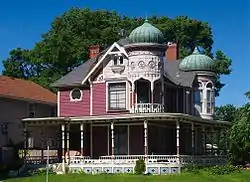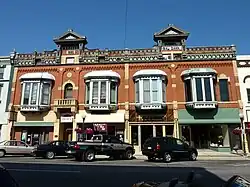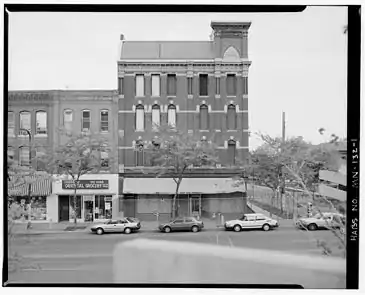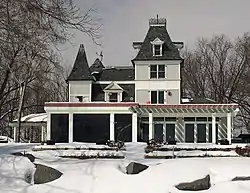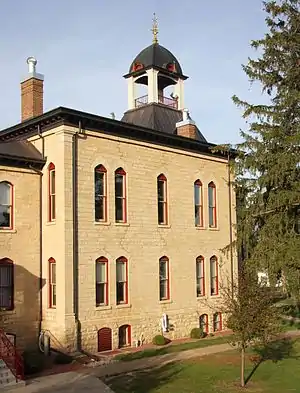Carl F. Struck
Carl F. Struck (January 29, 1842 – March 3, 1912) was a Norwegian American architect, who designed private residences, civic buildings and commercial structures throughout the Midwest in the latter part of the 19th century.[2]
Carl F. Struck | |
|---|---|
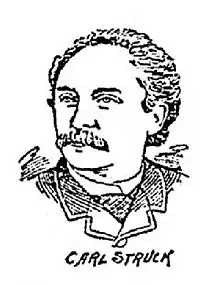 | |
| Born | January 29, 1842 [1] |
| Died | March 3, 1912 |
| Occupation | architect |
| Spouse | Vasillia Thrane |
Biography
Carl F. Struck was born in Christiania (now Oslo) Jan. 29 and christened in Oslo domkirke (Cathedral) Apr. 27 the same year, His parents were Hans Henrik Struck born in Eutin, Ostholstein and spouse Rønnaug Marie Jonasdr Elg born in Faaberg, Oppland. He was educated there and in Copenhagen before immigrating to the United States in 1865. After employment at architectural offices in Brooklyn, Cleveland, Chicago and Marquette, he arrived in Minneapolis in 1881, where he worked for the next twenty years. Among his most important commissions were designs for Scandinavian fraternal buildings and churches.[3]
The son of a German father and Norwegian mother (of Swedish descent),[4] Struck was married to Vasillia Thrane (1852- 1920), whose father, Marcus Thrane, was one of the founding fathers of the Norwegian labor movement.[5]
National Register of Historic Places
Two Minneapolis buildings designed by Carl F. Struck are in the National Register of Historic Places: the Bardwell–Ferrant House at 2500 Portland Avenue South and the Pracna Building in the St. Anthony Falls Historic District.[6] Another one of his Minneapolis works, Dania Hall, was added to the National Register of Historic Places in 1974 and removed from the list after its destruction by fire in 2000.[7] The main building of the Grain Belt Brewery in Northeast Minneapolis is also in the National Register of Historic Places. Although Struck did not contribute to its design, he was the architect for an office building at 1215 Marshall Street NE that was part of the complex.[8]
Selected buildings
- Minneapolis
- 1884 Chicago House [9]
- 1884 Harmonia Hall
- 1886 Dania Hall
- 1889 Normanna Hall [10]
- 1890 521 Cedar Avenue South [11]
- 1890 Pracna Building
- 1893 Grain Belt Office Building
- Other locations
- 1880 Vernon County Courthouse in Viroqua, Wisconsin
- 1890 Boesch, Hummel, and Maltzahn Block in New Ulm, Minnesota
- 1891 Brown County Courthouse in New Ulm, Minnesota
Gallery
References
- Minnesota biographies, 1655-1912 by Warren Upham and Rose Barteau Dunlap, (St. Paul: Minnesota Historical Society, 1912) p. 754.
- Minneapolis Brewing Company Historic District, p. 12 Archived 2013-12-12 at the Wayback Machine minneapolis.mn.us. Retrieved: December 8, 2013.
- Minneapolis Warehouse District Designation Study, p. 35 minneapolis.mn.us. Retrieved: December 8, 2013.
- Fra Amerika by Henrik Cavling, (Copenhagen: Gyldendal, 1897) p. 324.
- Jorgensen Music jorgensennotes.com. Retrieved: December 8, 2013.
- National Register of Historic Places listings in Hennepin County, Minnesota. wikipedia.org. Retrieved: December 8, 2013.
- National Register of Historic Places in Hennepin County: former listings. wikipedia.org. Retrieved: December 8, 2013.
- AIA guide to the Twin Cities by Larry Millett, (St. Paul: Minnesota Historical Society Press, 2007) p. 101.
- Warehouse District Inventory, p. 111 minneapolis.mn.us. Retrieved: December 9, 2013.
- Normanna Hall archive.org. Retrieved: May 28, 2019.
- A History of the Electric Fetus, p. 2 gtcbms.org. Retrieved: December 9, 2013.
External links
- Harmonia Hall
- Chicago House
- Grain Belt Office Building
- 521 Cedar Avenue South
- Buildings of Carl F. Struck
- Courthouses
Online book
Historic American Newspapers
